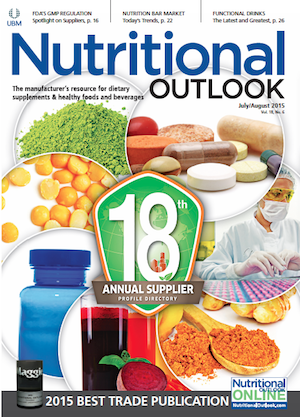Should FDA’s Dietary Supplement GMPs Include Ingredient Suppliers?
“Not having the cGMPs apply to ingredient suppliers definitely creates a gap in supply-chain integrity, says ONHA’s CEO and Executive Director Karen Howard.

As reported in June, attorneys general from New York and Indiana are calling on FDA to swiftly fix a “serious flaw” in the agency’s good manufacturing practices (GMP) regulation for dietary supplements-the “flaw” being the fact that ingredient suppliers are not subject to the GMP rule. The AGs’ letter to FDA comes on the heels of a citizen petition filed in May by a recently forged association, the Organic and Natural Health Association (ONHA), also asking FDA to require suppliers to answer to GMPs. It also follows a letter from a group of 13 attorneys general, again led by New York AG Eric Schneiderman, asking Congress in April to strengthen FDA oversight of the supplements industry.
FDA’s dietary supplement GMPs (21 CFR 111), enacted in 2007, apply to supplement manufacturers only, not ingredient suppliers. Interestingly, when FDA first proposed the GMPs in 2003, the regime did include suppliers. But when FDA released the final regulation in 2007, it excluded them. (The agency noted that it received comments during rulemaking supporting including suppliers, as well as comments objecting to their inclusion. American Herbal Products Association (AHPA; Silver Spring, MD) President Michael McGuffin says that AHPA supported the initial proposal to include suppliers.)
In an October 2007 public broadcast, FDA made clear that GMPs pertained only to supplement manufacturers:
“The Final Rule does not apply to dietary ingredient manufacturers or suppliers, but only to persons who manufacture, package, or hold dietary supplements. The manufacturer is thus responsible for ensuring that the ingredients used in the production of a dietary supplement are such that they produce a product consistently meeting cGMPs.”
FDA also noted, “It is important to note that excluding raw dietary ingredient producers/suppliers from cGMP does not weaken the rule, but rather shifts the burden for ensuring the quality of dietary ingredients used in dietary supplements to the manufacturer of the final product. A finished-product manufacturer still needs to ensure that the dietary ingredients used are the appropriate ones for the manufacturer's final product. This assurance of quality requires, at a minimum, an identify test of each incoming dietary ingredient to verify that the key ingredients are what they are purported to be.” (These statements were made by Vasilios “Bill” Frankos, MS, PhD, then-director of FDA’s Division of Dietary Supplement Programs. Frankos is now senior vice president of global product science, safety, and compliance at Herbalife.)
Dan Fabricant, CEO and executive director of the Natural Products Association (NPA; Washington, DC), says that it was an “economic” decision on the part of FDA to remove suppliers from the rule. (Fabricant served as directorâÂÂofâÂÂFDA’s DivisionâÂÂofâÂÂDietaryâÂÂSupplementâÂÂProgramsâÂÂin 2011–2014.) According to Fabricant, including suppliers would have “[driven] up costs in a way that doesn’t necessarily provide a benefit.” Case in point, he says: depending on where ingredient suppliers stand in the finished-product supply chain, requiring them to follow GMPs might not make sense. “For example, if a manufacturer buys a raw agricultural commodity and extracts it further, why should that ingredient supplier have to have a specification and a test for strength? So subjecting [ingredient suppliers] to the exact same rules [as manufacturers] just didn’t fit,” he says.
Many also expected that GMPs would indirectly force suppliers to up their quality-control procedures simply because manufacturers, in their efforts to meet their own GMP burdens, would require their suppliers of ingredients to provide stronger assurances of quality and safety. (Click here for more on this. )
Among those now asking FDA to revisit the rule to include suppliers, ONHA’s CEO and Executive Director Karen Howard tells Nutritional Outlook, “Not having the cGMPs apply to ingredient suppliers definitely creates a gap in supply-chain integrity.”
Should It Be Done?
Howard points out that neither ONHA nor the AGs, including New York AG Schneiderman, whom ONHA has been collaborating with on regulatory-overhaul proposals, have fully fleshed out just how suppliers should brought into the GMP fold. “I don’t think we have any prescriptive recommendations at this time. I think there’s some work that has to be done around what that means, what nuance has to be attributed to a different set of GMPs or a like set, and what that would look like,” she says.
Ray Matulka, PhD, director of toxicology for Burdock Group Consultants (Orlando, FL), told Nutritional Outlook that a singular, across-the-board GMP regulation would likely be complicated, considering that suppliers’ ingredient offerings are diverse and require varied specifications and testing. Calling the manufacturing process for finished goods “much more controlled,” Matulka points out that ingredients such as wild-sourced botanicals follow a different supply-chain roadmap than synthesized vitamins. “There’s such a wide range and such a diversity of different supplements that you’re going to be mandating aspects that probably do not fit for a certain segment of supplements, and therefore some manufacturers just will not be able to meet a mandate because it’s not feasible for their production process,” he says. “That’s trying to fit every square into a round hole, and it’s just not going to work.”
While Howard agrees that “there should always be some flexibility at the manufacturing level and the processing level,” it’s uncertain what a supplier GMP might look like. Howard again reiterates that “we haven’t gotten into that level of detail yet.” But she contends that ingredient suppliers do share some similarities in how they meet their responsibilities today. “When you look at what contract manufacturers generally request from their raw-ingredient suppliers, it’s identity, it’s microbial tests, it’s certificate of analysis. Contract manufacturers of varying interests require their ingredient suppliers to provide different kinds of tests. All of the ingredient suppliers know what those tests are.”
At the macro level, she says, mandating supplier GMPs would shift some of the GMP onus off manufacturers. “It could potentially reduce the burden on the contract manufacturer and spread it out across the supply chain. Because right now, all [the suppliers] do is push all of the risk down to the contract manufacturers.”
And, she says, “We’re not going to say that if the raw-ingredient suppliers do four tests, then the contract manufacturer supplier doesn’t have to do any. There’s an obligation to the consumer to keep that integrity of the supply chain moving forward at each step, so there have to be checks and balances along each step of the manufacturing process.”
Existing Regimes
Identity testing, microbial analysis, traceability. Putting GMPs aside, do any existing FDA regulations already make ingredient suppliers directly answer to these types of quality-control measures? Yes, in theory. FDA’s Food Safety Modernization Act (FSMA), made law in 2011 and still rolling out now, includes two rules that will, once fully implemented, apply directly to ingredient suppliers.
FSMA’s Preventive Controls for Human Food regulation will require ingredient suppliers to identify potential hazards, including adulterants and contaminants, and to establish prevention protocols. Meanwhile, FSMA’s Foreign Supplier Verification Program is expected to safeguard the foreign ingredient supply chain by ensuring that foreign suppliers meet the same GMPs and hazard-analysis rules required of U.S. suppliers.
These FSMA requirements will “hugely” affect supplier quality, says AHPA’s McGuffin. “It’s going to require the suppliers to meet a very high standard for manufacturing practice and prevention control.”
He continues, “The FSMA rule is going to place pretty much the same burden [that manufacturers face under their GMPs] on the supplier because [the supplier is] going to have to establish identifying hazard points and establish prevention controls. So if you’re in the business of supplying those ingredients, you’re going to have the same burden outbound as the manufacturer is inbound. So it will be controlled twice; it will be controlled by the supplier, and it will be controlled by the manufacturer.”
He also points out that FSMA itself is a GMP system. “[FSMA and the dietary supplement GMPs] are both GMPs. Right now, ingredient suppliers have to comply with the GMPs for foods (21 CFR 110). That’s going to get repealed [with FSMA’s implementation], and then they’re going to have to comply with the new GMP for foods [FSMA], which includes the Preventive Controls (21 CFR 117). And supplement companies have to comply with 21 CFR 111, the dietary supplement GMPs. Do I believe that ingredient suppliers’ compliance with 21 CFR 117, in combination with manufacturers’ compliance with 21 CFR 111, constitutes sufficient protection to ensure quality of the finished product? Absolutely.”
Of course, FSMA’s success remains to be seen and depends on how the regulation works once fully operational. Neither the Preventive Controls nor the Foreign Supplier Verification arms of FSMA have fully rolled out.
Howard calls FSMA’s success “pure speculation at this point,” and NPA’s Fabricant says, “They haven’t been implemented yet, so it’s tough to say. I would like to think that they will be, but we need to wait to see what the implementation looks like and what the plans are like rolling out.”
Some, like ONHA and the AGs mentioned earlier, say they do not want to wait years to see whether FMSA will help. “I think, in theory, [FSMA] is something that is potentially viable, but it also could be two, three, four, five, six years out,” Howard says. In the meantime, if there are problems with industry-wide quality control-“and people have acknowledged there has been a problem for a long time,” she says-“then what can you do immediately? What can be expedient and effective? Our position on that is, at a minimum, the raw-ingredient suppliers need to be able to adhere to GMPs.”
“There’s no need to wait for congressional action to drastically improve federal oversight of the dietary supplement industry,” AG Schneiderman said in his press release announcing the June letter sent to FDA claiming that “by exercising the agency’s rulemaking authority, FDA can independently achieve certain vitally needed reforms.”
Does FDA even have the bandwidth for a GMP rework at this point in time? “I don’t think that they would be able to do that at the moment,” Burdock’s Matulka says. “They’re having a hard enough time getting FSMA implemented, and so to take an extra step and overhaul the GMPs for dietary supplements while they’re also trying to adhere to these guidelines for FSMA, I don’t see how they could do that at the moment.”
Fabricant says that in his opinion, it would be better to wait to see how FSMA plays out. “Let’s see what happens with the Preventive Control Rules, and we’ll take it from there. I don’t see [amending the GMPs] as a necessity.”
Jennifer Grebow
Editor-in-Chief
Nutritional Outlook magazine
jennifer.grebow@ubm.com
Also read:
Which Way to Quality Assurance?
NY Attorney General Extends Investigation to Manufacturers
Photo © iStockphoto.com/hh5800

HHS announces restructuring plans to consolidate divisions and downsize workforce
Published: March 27th 2025 | Updated: March 27th 2025According to the announcement, the restructuring will save taxpayers $1.8 billion per year by reducing the workforce by 10,000 full-time employees and consolidating the department’s 28 divisions into 15 new divisions.




















